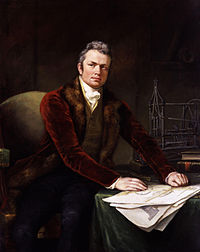Marc Brunel
| Marc Isambard Brunel | |
|---|---|

Sir Marc Isambard Brunel,
by James Northcote |
|
| Born |
Marc Isambard Brunel 25 April 1769 Hacqueville, Normandy, France |
| Died | 12 December 1849 (aged 80) London, England |
| Resting place | Kensal Green Cemetery, London |
| Nationality |
|
| Occupation | Engineer |
| Known for | Thames Tunnel |
| Spouse(s) | Sophia Kingdom |
| Military career | |
| Allegiance |
|
| Service/branch | French Navy |
| Years of service | 1786–1792 |
Sir Marc Isambard Brunel, FRS FRSE (25 April 1769 – 12 December 1849) was a French-born engineer who settled in England. He preferred the name Isambard, but is generally known to history as Marc to avoid confusion with his more famous son Isambard Kingdom Brunel. His most famous achievement was the construction of the Thames Tunnel.
Brunel was the second son of Jean Charles Brunel and Marie Victoire Lefebvre. Jean Charles was a prosperous farmer in Hacqueville, Normandy, and Marc was born on the family farm. It was customary for the first son to inherit the farm and the second son to enter the priesthood. His father therefore started Marc on a classical education, but he showed no liking for Greek or Latin and instead showed himself proficient in drawing and mathematics. He was also very musical from an early age. At the age of eleven he was sent to a seminary in Rouen. The superior of the seminary allowed him to learn carpentry, and he soon achieved the standards of a cabinetmaker. He also sketched ships in the local harbour. As he showed no desire to become a priest, his father sent him to stay with relatives in Rouen, where a family friend tutored him on naval matters. In 1786, as a result of this tuition, Marc became a naval cadet on a French frigate and during his service visited the West Indies several times. He made a quadrant for himself of brass and ivory, and used it during his service.
During Brunel's service abroad, the French Revolution began, in 1789. In January 1792, Brunel's frigate paid off its crew, and Brunel returned to live with his relatives in Rouen. He was a Royalist sympathiser, as were most inhabitants of Normandy. In January 1793, whilst visiting Paris during the trial of Louis XVI, Brunel unwisely publicly predicted the demise of Robespierre, one of the leaders of the Revolution. He was lucky to get out of Paris with his life, and returned to Rouen. However it was evident that he would have to leave France. During his stay in Rouen, Brunel had met Sophia Kingdom, a young Englishwoman who was an orphan and was working as a governess. Unfortunately he was forced to leave her behind when he fled to Le Havre and boarded the American ship Liberty, bound for New York.
...
Wikipedia
